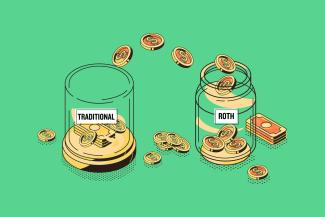
When and why would a Roth conversion be advantageous?
Tax deferred savings accounts such as IRAs or 401Ks are powerful ways to build retirement nest eggs. Until 1998, the only IRAs available to investors were traditional or “pretax” IRAs, meaning funds deposited to the IRA are deductible from one’s gross income on their tax return and therefore are, temporarily, untaxed.
In 1998, another form of the IRA was introduced in what is known as a Roth IRA. Roth IRAs differ from traditional IRAs in that contributions to a Roth are considered “after tax,” or already taxed dollars, and cannot be deducted from one’s gross income. All funds withdrawn from a traditional IRA are taxable in the year in which the withdrawal occurs. With a Roth, if certain conditions are met, there is no tax on funds withdrawn either by the owner or the owner’s account beneficiaries.
One interesting feature about Roth IRAs is that they may be created or funded through the conversion of a previously existing tax deferred account such as an IRA or 401k. This conversion is what is known as a “Roth conversion”. There is no limit to the size of a Roth conversion. The primary consequence of doing a Roth conversion is all the money converted from the tax deferred account into the Roth becomes 100% taxable in the year in which the conversion occurs. This conversion feature has implications for both financial and estate planning.
When and why would a Roth conversion be advantageous? Tax bracket changes have a lot to do with this. If one drops into a lower tax bracket early in retirement or even before retirement, it could make sense to take advantage of the lower bracket and accelerate traditional IRA withdrawals while still keeping the funds in a tax advantaged vehicle such as a Roth. Another reason may be for estate planning purposes. For example, a parent who may wish to leave a portion of his/her estate to heirs tax free could accelerate the conversion from a traditional to a Roth IRA and thereby eliminate the tax liability to the heirs.
There are circumstances in which it may not make sense to do a Roth conversion. This could occur if the tax impact of the conversion materially impairs the client’s cash flow or retirement capital. A conversion may not make sense if there is no quantifiable advantage or estate strategy for doing the conversion. Also, the timing of when taxes are actually paid should be considered. A dollar of tax paid, say in 20 years, has a much lower present value (lower “financial cost”) than a dollar paid today. These and other factors can be better assessed within the context of a comprehensive financial plan. To the extent the financial plan shows little or no advantage to a Roth conversion, it may not be advisable. These and other nuances of Roth conversions are all the more reason to work with a competent financial planner in making these decisions.

